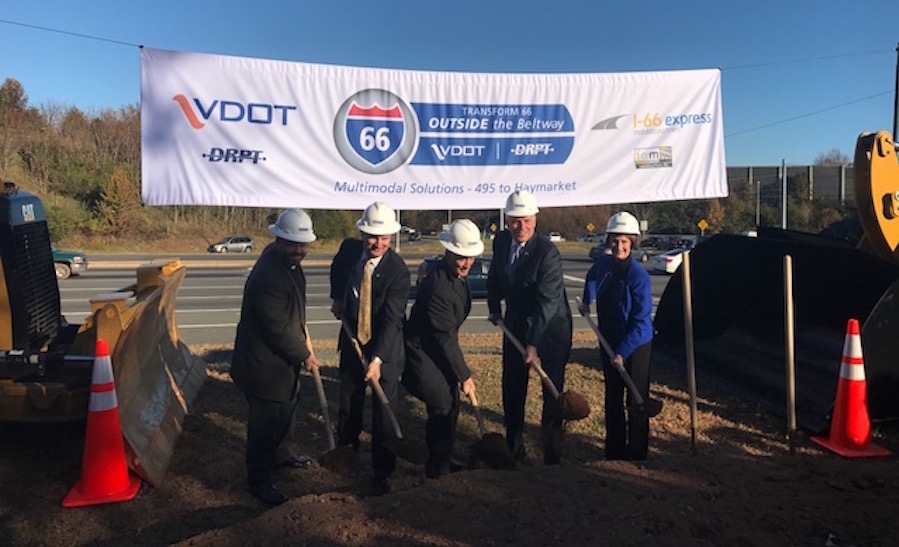Virginia Expanding Network of Tolled Express Lanes

The latest addition to Virginia’s growing portfolio of P3-built tolled express lanes officially got underway on Nov. 20, with the ceremonial groundbreaking for the $3.7 billion Transform 66 Outside the Beltway project.
During the next 54 months, Express Mobility Partners, a consortium led by Cintra and Meridiam Infrastructure, will oversee the installation of two dynamically tolled express lanes in both directions along 22.5 miles of I-66 between the Capital Beltway and University Boulevard in Gainesville. There also will be three general-purpose traffic lanes in both directions. I-66 currently has four lanes in each direction, including a dedicated lane for high-occupancy vehicles (HOV) during rush hours.
The design-build team is being led by FAM Construction, a joint venture between Ferrovial Agroman U.S. and Allan Myers, VA.
As part of its bid for the 50-year concession to operate and maintain the express lanes, Express Mobility Partners has committed to invest $800 million in public transit, and $350 million on a variety of transportation improvements in the corridor, including upgraded interchanges, new park-and-ride spaces and a multi-use trail alongside I-66.
A complementary project to implement dynamic rush hour tolling on I-66 inside the Beltway becomes operational in December. The ten-mile section, previously restricted to HOV during peak east- and westbound travel hours, has been equipped with automatic toll collection equipment that makes the road available during those times to all vehicles equipped with an EZ Pass transponder. Limited right-of-way and local concerns about the effects of increased traffic have precluded most attempts to widen I-66 beyond its current four-lane configuration.
December will also see the start of another HOV-to-toll-lane conversion in Northern Virginia. Transurban, Virginia’s private partner for the I-95 and I-495 express lanes will begin changing the existing decades-old reversible rush-hour HOV lanes in the eight-mile I-395 corridor to a three-lane toll configuration that will become part of the existing 31-mile I-95 express lane system. The $480 million project is expected to be complete in the fall of 2019.
At the south end of the I-95 express lanes in Stafford County, Branch Highways recently completed a $50 million, two-mile extension to alleviate congestion from traffic merging onto the general-purpose lanes. Virginia hopes to approve a design-build team next fall to extend the I-95 express lanes by another 10 miles, crossing the Rappahannock River and ending south of Fredericksburg. Transurban will be responsible for operations and maintenance for the entire I-95 express lane system.


